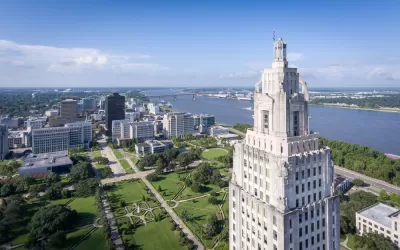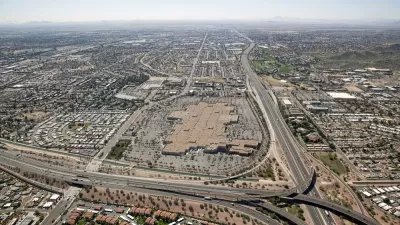A wealthy portion of Baton Rouge will split off and incorporate its own city in what proponents say is a bid for better schools and reduced crime, but critics say it will gut Baton Rouge’s tax base and result in a wealthy ‘white enclave.’

In what’s being called a landmark ruling, the Louisiana Supreme Court has authorized the incorporation of a new city called St. George in the suburbs of Baton Rouge, Louisiana. The New York Times reports that a 60-square-mile area in the southwest of East Baton Rouge Parish — and the 86,000 residents who live there — will be split off from the blended government that oversees both Baton Rouge and the broader parish and to form an independent city, complete with its own mayor, city council, and public services. The decision is making big waves throughout the region and beyond.
Rick Rojas of the NYT reports that plans started more than 10 years ago when the area’s predominantly wealthy, white residents tried and failed to start a school district spurred by concern that East Baton Rouge Parish schools were underperforming. That turned into an effort to collect enough signatures to form their own city, which they believe will solve their ongoing frustrations around not only schools but also crime, infrastructure, and allocation of resources under the existing city-parish government.
That proposal made it onto the ballot in 2019 and won the vote, which “spurred an immediate legal challenge as parish officials feared the consequences of losing $48 million in annual tax revenues. They argued that the new city could not operate with a balanced budget and the proposed budget for St. George was inaccurate,” NYT’s Rojas writes. The Louisiana Supreme Court overturned lower court rulings, finding that St. George could operate within its estimated tax revenues and provide public services within a reasonable period of time.
The decision has been met with disappointment, skepticism, and anger both locally and from across the country. Apart from what are sure to be massive logistical challenges of the separation and creation of St. George, “[critics] argue that the division may exacerbate racial and economic disparities within the region, calling it the creation of a ‘White enclave’ and claiming it would damage Baton Rouge’s predominantly Black communities and its school district,” writes Washington Times staff.
Land use regulations have a long history as tools for segregation and discrimination against Black people, indigenous people, and people of color in the United States. This decision could have huge implications for the people of Baton Rouge, the region, and beyond if communities elsewhere decide to take similar action. Whether or not St. George’s annexation of primarily affluent white areas is racially motivated — the group behind the new city’s formation says it’s not — its effects on the predominantly Black and low-income communities from which they’ve separated will remain the same. The legacy of similar land use decisions and policies that supported white flight throughout this country’s history are visible in the racial and economic disparities that exist in cities and towns to this day.
FULL STORY: Louisiana Will Get a New City After a Yearslong Court Battle

Study: Maui’s Plan to Convert Vacation Rentals to Long-Term Housing Could Cause Nearly $1 Billion Economic Loss
The plan would reduce visitor accommodation by 25,% resulting in 1,900 jobs lost.

North Texas Transit Leaders Tout Benefits of TOD for Growing Region
At a summit focused on transit-oriented development, policymakers discussed how North Texas’ expanded light rail system can serve as a tool for economic growth.

Using Old Oil and Gas Wells for Green Energy Storage
Penn State researchers have found that repurposing abandoned oil and gas wells for geothermal-assisted compressed-air energy storage can boost efficiency, reduce environmental risks, and support clean energy and job transitions.

Private Donations Propel Early Restoration of Palisades Playground
Los Angeles has secured over $1.3 million in private funding to restore the Pacific Palisades playground months ahead of schedule, creating a modern, accessible space that supports community healing after recent wildfires.

From Blight to Benefit: Early Results From California’s Equitable Cleanup Program
The Equitable Community Revitalization Grant (ECRG) program is reshaping brownfield redevelopment by prioritizing projects in low-income and environmental justice communities, emphasizing equity, transparency, and community benefits.

Planting Relief: Tackling Las Vegas Heat One Tree at a Time
Nevada Plants, a Las Vegas-based nonprofit, is combating the city’s extreme urban heat by giving away trees to residents in underserved neighborhoods, promoting shade, sustainability, and community health.
Urban Design for Planners 1: Software Tools
This six-course series explores essential urban design concepts using open source software and equips planners with the tools they need to participate fully in the urban design process.
Planning for Universal Design
Learn the tools for implementing Universal Design in planning regulations.
Ascent Environmental
Borough of Carlisle
Institute for Housing and Urban Development Studies (IHS)
City of Grandview
Harvard GSD Executive Education
Toledo-Lucas County Plan Commissions
Salt Lake City
NYU Wagner Graduate School of Public Service





























